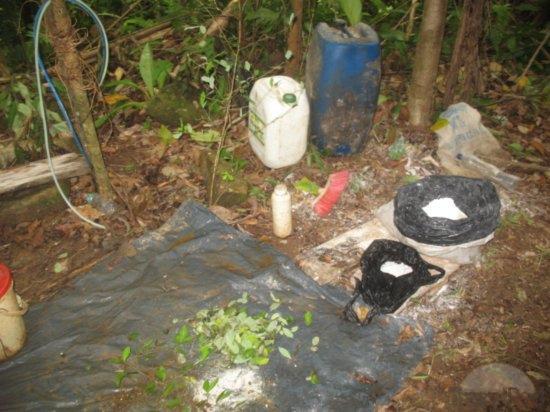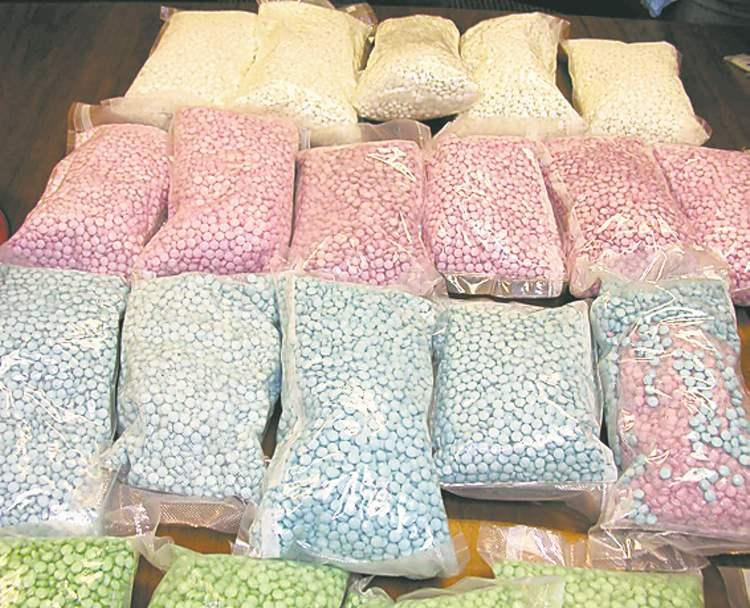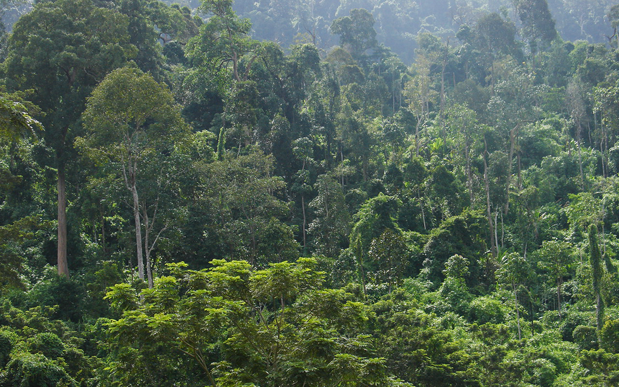Under prohibition, drug supply is unregulated and handled by gangsters. As such, our highs often come with immense ecological harm. It doesn’t have to be like this. Taxed, regulated and supplied by companies open to public scrutiny, not only would recreational drugs be safer, of a higher quality and properly labelled; there would also be a market for ethical narcotics. EcoHustler humbly presents the ecological E for your consideration.
 A jungle cocaine production factory
The environmental damage caused by insatiable western cocaine habits has been widely known for a long time. Each line snorted carves giant swaths of destruction through the South American jungle. Eager primate nostrils twitch in glee as mighty trees and the myriad creatures they contain are hoovered into oblivion. The soil is spoiled too, the coca extraction process requires ammonia and kerosene and leaves behind a toxic mess.
In contrast, many recreational drug users might have thought that an ecstasy pill was an environmentally benign supplement to weekend festivities. We thought E was synthetic, a chemical manufactured in Holland bypassing most of the hell caused by the International War on Drugs. This is not the case - E is made of safrole, an oily liquid typically extracted from the root-bark or the fruit of sassafras plants. As demand for the raw material increases in growing markets such as the USA, tree populations in countries of supply, such as Cambodia are being decimated.  Seized ecstacy tablets
SUPPORTED BY HEROES LIKE YOU
Support independent eco journalism that drives real change.What is the best way to reduce the environmental impact of the drug trade?
The current approach, prohibition (AKA The War on Drugs) carries immense social costs in at least four ways: firstly, the costs of fighting a war that never ends; secondly, missing the vast tax revenues that could be earned by governments regulating the trade; thirdly, by then having to run a vast punishment apparatus which in many cases aggravates drug abuse and fourthly, by exacerbating environmental impacts.
Prohibition fails to reduce either demand or supply and increases the trade’s environmental harm. Under cover of darkness criminal gangs extract as many safrole trees as they can from Cambodia's tropical forests to make ecstasy tablets. They have no incentive to operate sustainably and even if they did no means to communicate this to the market.  Illicit safrole-oil factory deep in the Cardamom mountains of Cambodia
Simplistic and ill thought out interventions by law enforcement agencies actually increase the environmental harm caused by the illegal drug trade. Burning seized safrole constrains supply pushing the price up, further motivating criminal gangs to cut down more trees.  Drug decriminalisation is presented as a way to reduce the harm caused by drugs across society. Is it time to go further and also imagine what an eco and fair-trade narcotics trade might look like and how this could benefit the ecosystems providing the raw materials?
Ecstasy create blissful states of euphoria in which users feel a profound connection to music, the people around them and the universe. As with other drugs it can offer a shortcut to profound spiritual experiences of connectedness. As such, it has global appeal on dance floors as well as therapeutic functions, for example, treating post traumatic stress disorder. Drug expert Professor David Nutt famously remarked that ecstasy is 'no more dangerous than horse riding.' Isn't it time our governments took a more grown up approach to its burgeoning global trade?
Instead of prohibition, regulation and taxation would allow for ecstasy to be safely produced and sold, whilst generating huge tax revenue for governments. Additionally, applying harvesting best-practice could ensure that the raw material is extracted sustainably without the need to destroy the whole tree. This source of revenue could actually protect vulnerable forest.  Healthy Cambodian forest - good for everyone
In a legal drug trade there would be room for social entrepreneurs to offer ethical and ecologically sound products. The companies could sustainably harvest safrole, make fair-trade and ecological ecstasy tablets, sell them for a premium and use that money to replant forests. Imagine it - an ethical dealer that plants a tree for every E you buy - that might even take the edge off the come down. 




